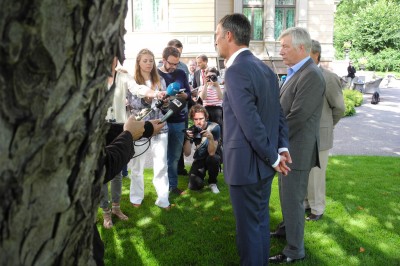Prime Minister Jens Stoltenberg interrupted his summer holidays and those of several others to host an emergency session on the debt crises in Europe and the US. Stoltenberg warned that the crises can be serious for Norway as well, despite the country’s strong economy and oil reserves.

“We mustn’t have any illusions that a new international economic setback won’t hurt Norway,” Stoltenberg said. He cautioned against thinking that wealthy and fortunate Norway will avoid collateral economic damage.
“We have a small and open economy and depend on selling products and services to other countries,” Stoltenberg noted. “If they buy less, it will affect Norwegian jobs. A deepening debt crisis in Europe can mean that those making car parts in Raufoss and boats in western Norway will lose their jobs.”
Stoltenberg gathered his finance minister, Sigbjørn Johnsen, the former and current chiefs of Norway’s central bank and top financial regulators to summarize the status of the crises and discuss various possible outcomes. Johnsen agreed the situation was “very serious” but also believes Norway’s strong economy is well-positioned to withstand any effects of the crisis.
It was only recently that Johnsen and a large group of local economists agreed that Norway is among the “luckiest” countries on earth because of its lack of national debt, its oil reserves and control over the largest sovereign wealth fund in the world. Johnsen repeated on Wednesday that the Norwegian economy is “solid” and that “we have reserves to put in place if a new (global finance) crisis breaks out.”
‘Over-reaction’
His comments indicated that Stoltenberg doesn’t need to be too worried, and some economists scoffed at the emergency session. Harald Magnus Andreassen, chief economist for First Securities, told newspaper Aftenposten that he thought Stoltenberg was over-reacting by bringing Johnsen home from holiday in Denmark, while others viewed the session as politically motivated to assure voters that Stoltenberg’s left-center government was also on the job while his counterparts on the continent huddled in real marathon emergency talks. German Chancellor Angela Merkel and French President Nicolas Sarkozy, for example, talked long into the night before reaching agreement on a new support strategy for Greece. With them working so hard, Stoltenberg may have been uncomfortable on holiday.
Andreassen seems to think Stoltenberg could have continued to take a break. “For Norway this is not dramatic,” Andreassen told Aftenposten. “Households are saving more and businesses’ loan growth is lower now than in 2008. A lot more needs to happen before the entire world economy hits a real problem.”
Stoltenberg nonetheless was grim and also seized the opportunity to chide both European and US tax reform policies. He believes the conservatives’ lengthy battle for tax relief has fed their own dramatic debt crises.
“The right-wing in both Europe and internationally has said that tax relief would promote economic growth,” said Stoltenberg, who was educated as a social economist. “That hasn’t happened, it has created huge national debt. If the US had maintained the same tax levels that the country had under (former US President Bill Clinton, when the US had a budget surplus), the country’s debt problems would be solved. And if Europe had the same tax levels as Norway, much of the European debt crisis would be solved.”
Stoltenberg claimed that no country can expect tax levels like those in the US to yield the welfare like that found in Norway. Stoltenberg’s unusually harsh criticism of other countries is backed up by recent statistics from the OECD, reported business newspaper Dagens Næringsliv (DN), which shows that Norway and the Nordic countries have much higher tax- and fee revenue as a percentage of gross national product. Denmark’s was the highest.
Views and News from Norway/Nina Berglund
Join our Readers’ Forum or comment below.
To support our news service, please click the “Donate” button now.

